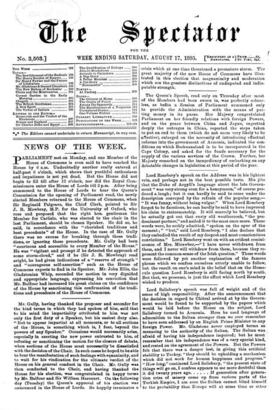NEWS OF THE WEEK.
PARLIAMENT met on Monday, and one Member of the House of Commons is even said to have reached the House by 6 a.m. Undoubtedly another really entered at half-past 6 o'clock, which shows that youthful enthusiasm and impatience is not yet dead. But the House did not begin to fill till after 12 o'clock, nor did the Royal Com- missioners enter the House of Lords till 2 p.m. After being summoned to the House of Lords to hear the Queen's Commission for the opening of Parliament read, the newly elected Members returned to the House of Commons, when Sir Reginald Palgrave, the Chief Clerk, pointed to Sir J. R. Mowbray, M.P. for the University of Oxford, who rose and proposed that the right hon. gentleman the Member for Carlisle, who was elected to the chair in the last Parliament, should be chosen Speaker. He did so, he said, in accordance with the "cherished traditions and best precedents" of the House. In the case of Mr. Gully there was no excuse for breaking through these tradi- tions, or ignoring these precedents. Mr. Gully had been " courteous and accessible to every Member of the House." He was "vigilant and prompt if he detected the approach of some storm-cloud," and if he (Sir J. R. Mowbray) read aright, he had given indications of a "reserve of strength" and " courageous self-assertion" such as the House of Commons expects to find in its Speaker. Mr. John Ellis, the Gladstonian Whip, seconded the motion in very dignified and appropriate language, expressing his conviction that Mr. Balfour had increased his great claims on the confidence of the House by sanctioning this confirmation of the tradi- tions and precedents of the House of Commons.


































